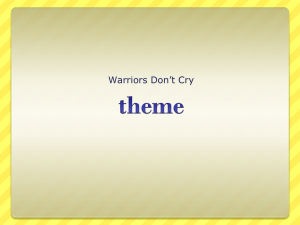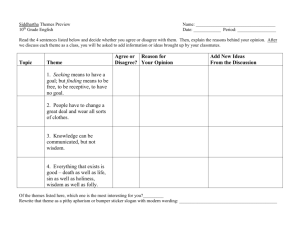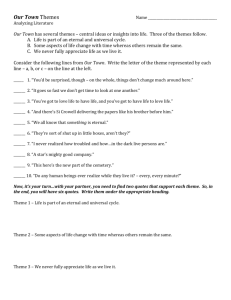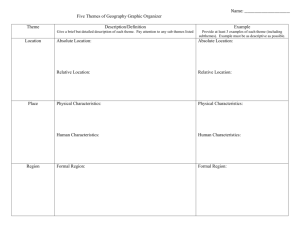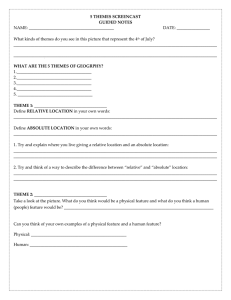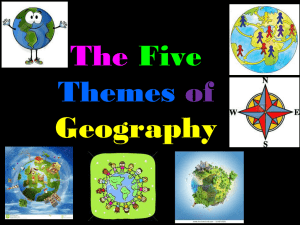Warriors Don’t Cry
advertisement
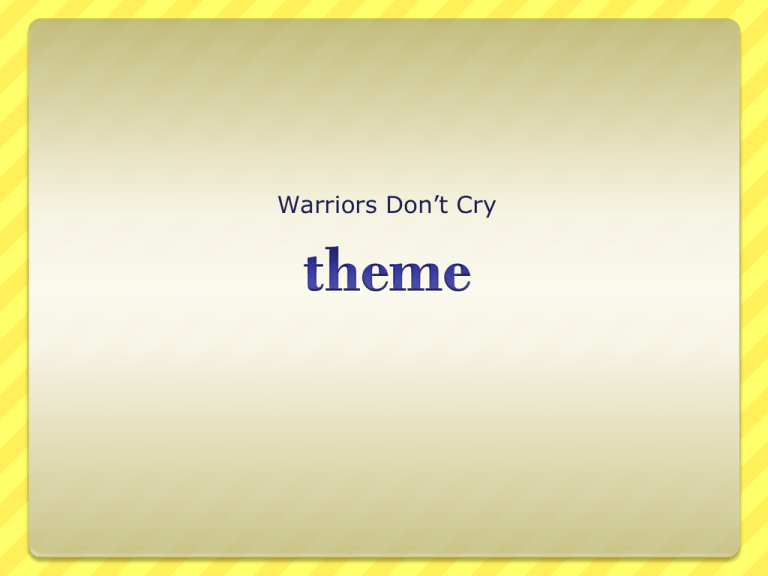
Warriors Don’t Cry What is theme? Theme: Life lesson, meaning, moral, or message about life or human nature that is communicated by a literary work and recurs throughout the work. Theme is what our story means. How it relates to reality and life in general. What is says about life and the infinite roster of issues, facets, challenges and experiences it presents. Theme can be a broad topical arena, or it can be a specific stance on anything human beings experience in life. In other words… Theme is what the story teaches readers. Theme is the relevance of the story to your life. Themes A theme is not a word, it is a sentence. You don’t have to agree with the theme to identify it. (The sentence will always include one of our universal theme words.) Examples Money can’t buy happiness. Don’t judge people based on the surface. It is better to die free than live under tyranny. Identifying Themes Themes are not explicit or literal (clearly stated). Themes are implied (interpretive/evaluative). Themes are bigger than the story. Themes are about the big picture. NOT “The red sweater is ugly” NOT “Melba didn’t like the white school because the people were mean.” Think BIGGER. Find “Real” World advice – UNIVERSAL advice. Review 1.Theme is what we can learn from a story that relates to the real world – your world. 2.Themes must be inferred. 3.Themes are about the BIG world. Practice 1.We’ll read each story. 2.Write what you think the theme is. 3.Write another sentence explaining what happens in the story that leads you to believe this. How does the small world of the story connect to the big world theme? Once there was a mean little boy who lived in a small village. This mean little boy loved to mess with people, so one day he ran up to a sheep herder and shouted, “WOLF! WOLF! A wolf is attacking the town!” The sheep herder grabbed his staff and ran to defend the town, but realized he had been fooled when the boy started pointing and laughing at him. “Ha ha! I made you jump,” said the boy. Then the boy ran up to a farmer and shouted, “WOLF! WOLF! A wolf is attacking the town!” The farmer grabbed his pitchfork and ran to defend the town, but when the boy started pointing and laughing at him, he realized he had been tricked. As the boy went back to his family’s farm laughing about the funny trick he played, he saw a real wolf in his father’s chicken coop. As the wolf ate all of his father’s chickens, the boy screamed over and over again, “WOLF! WOLF! Please help us!” But nobody came to help him. Jenny hated reading class. She didn’t understand point of view or figurative language, and not knowing how to do the work frustrated her. She asked the teacher for help, but he spoke so fast and used such big words that she still couldn’t understand. The teacher asked if she understood, and she nodded her head, but she didn’t. Jenny’s friend Katie knew that Jenny was having trouble, and, rather than just giving Jenny all of the answers, Katie explained to Jenny how to solve the problems. Katie spoke clearly and at Jenny’s level, and Jenny was happy that she finally learned how to do the work. Later in the week, Katie was having trouble in math class. She didn’t understand coordinates and was really frustrated. Seeing that Katie was having problems, Jenny, who understood math very well, taught Katie coordinates. Both girls made honor roll that quarter.
